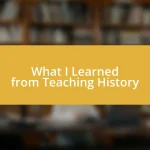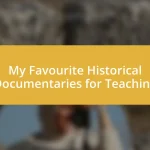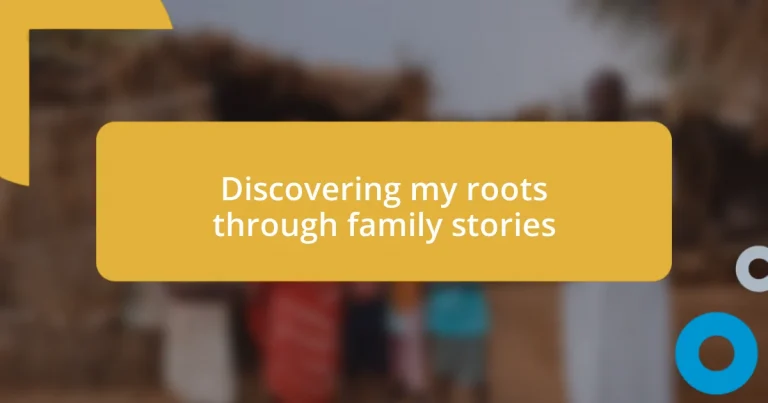Key takeaways:
- Understanding family history involves uncovering the stories of our ancestors, fostering connections to their struggles and values.
- Storytelling strengthens family bonds and preserves legacies, making ancestors’ experiences relatable and enriching our own identities.
- Utilizing technology, such as recording gatherings and using social media or genealogy websites, enhances the preservation and sharing of family narratives across generations.
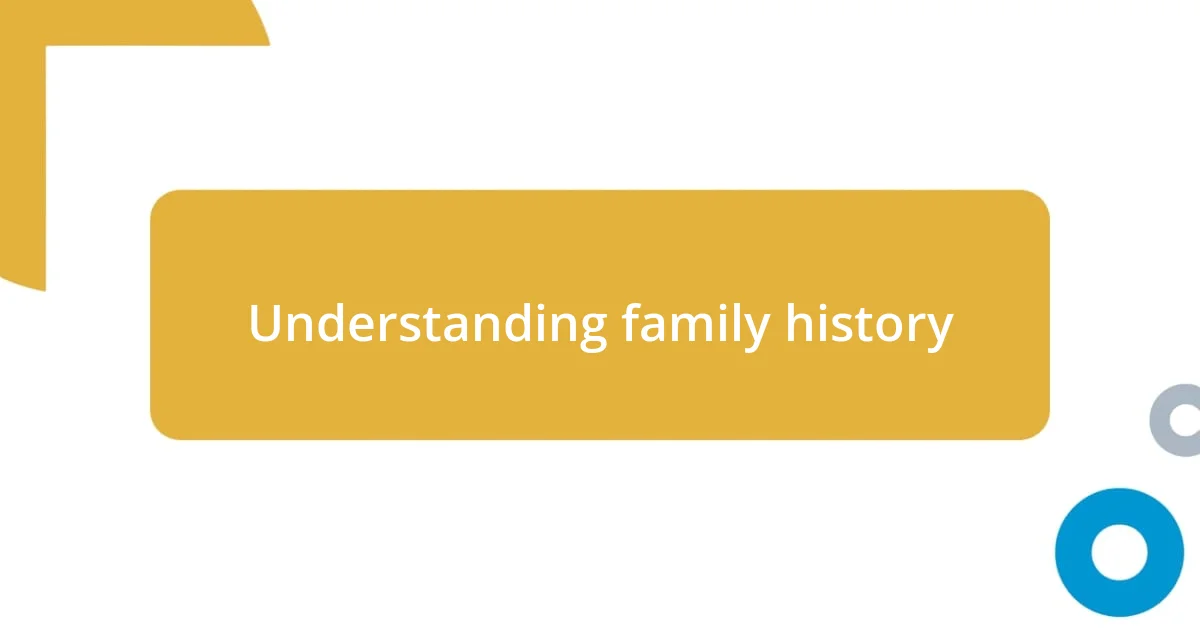
Understanding family history
Understanding our family history goes beyond just names and dates; it’s about uncovering the stories that shaped our ancestors’ lives. I vividly remember sitting with my grandmother, as she shared tales of her childhood during the war. Those stories didn’t just teach me about the past; they made me feel a connection to her struggles and triumphs, something that resonates deeply within me.
Have you ever found yourself wondering what life was like for your great-grandparents? When I started researching my lineage, I became fascinated by their journey. I discovered that my great-grandmother immigrated from Italy, seeking a brighter future, and that knowledge brought me closer to understanding the sacrifices made for my family. It’s a humbling experience to realize that our present is intertwined with their challenges and hopes.
Each discovery reveals patterns, traditions, and values that have been passed down through generations. I remember uncovering a family recipe that had been in our lineage for decades. Cooking it not only felt like honoring my heritage but also ignited a sense of pride in my identity, reminding me of where I came from. This exploration isn’t just an academic exercise; it’s a powerful opportunity to appreciate the resilience and stories that define who we are today.
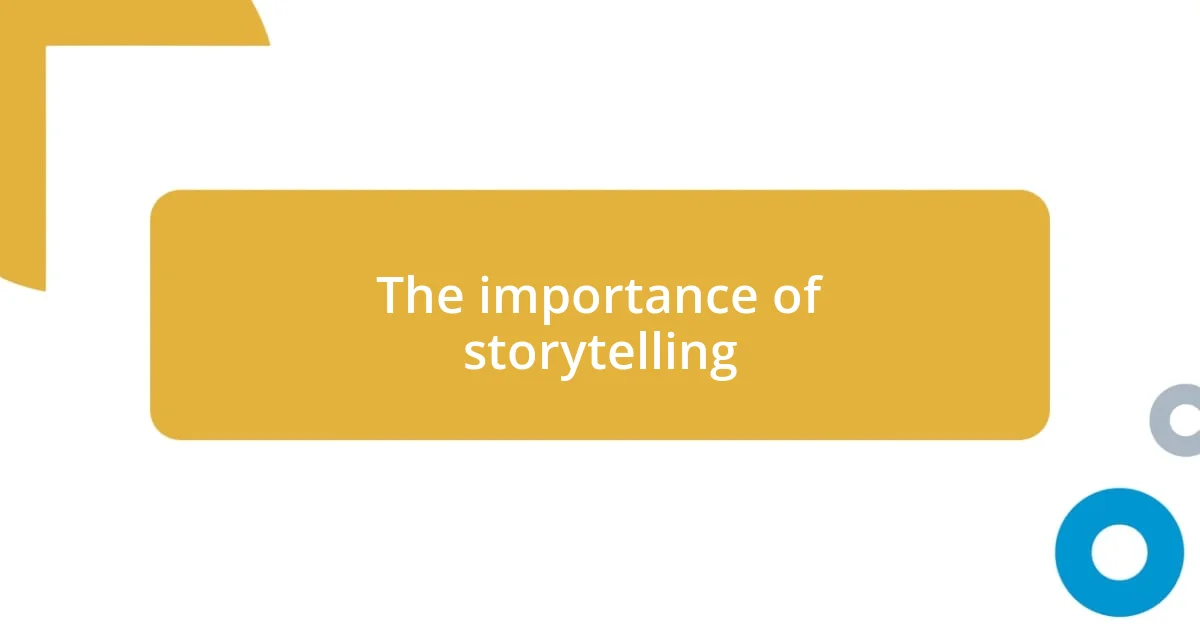
The importance of storytelling
Storytelling serves as a bridge connecting past to present. I often think about a story my father told me about his first job, working as a young boy in his father’s bakery. Listening to the way he described the warmth of the bread and the laughter that filled the shop transported me back in time. Those anecdotes are more than memories; they offer valuable lessons about hard work and perseverance, shaping my own outlook on life.
- Stories humanize our ancestors, making their experiences relatable.
- They enrich our understanding of cultural values and family traditions.
- Engaging with family tales fosters a sense of belonging and identity.
- Sharing stories can strengthen family bonds, creating shared memories.
- Each narrative holds the potential to inspire and empower future generations.
Reflecting on these stories, I realize how storytelling becomes a way to honor those who came before us. It brings their triumphs and struggles to life, ensuring that their legacies continue to resonate with us today.
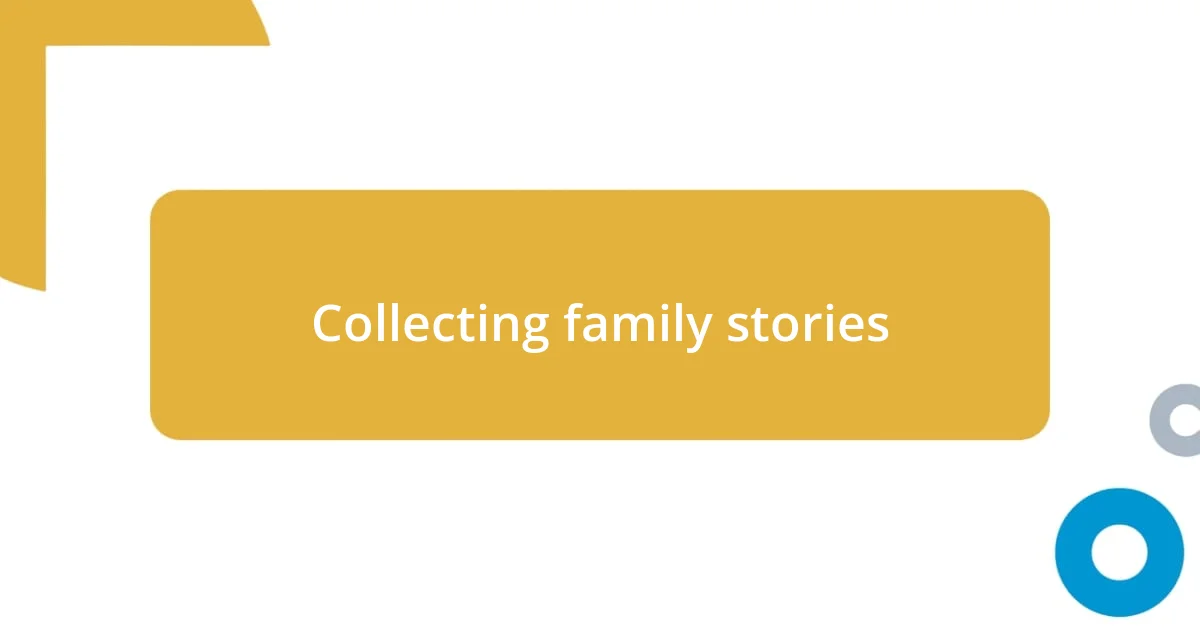
Collecting family stories
Collecting family stories can be a profoundly enriching experience. I remember one rainy afternoon when I sat down with an old scrapbook my mother had tucked away. Flipping through its yellowed pages, I found handwritten letters from my great-uncle during World War II. Each word painted a vivid picture of his fears, hopes, and the friendships that helped him survive. These letters sparked conversations with my family, revealing layers of history I had never considered.
As I began to delve deeper into my family’s past, I realized that connecting with relatives can unearth treasures beyond the expected. I reached out to distant cousins I hadn’t seen in years, and to my surprise, they shared a wealth of stories about my grandfather’s playful, mischievous spirit that brought smiles to everyone’s faces. It was heartwarming and eye-opening to hear these anecdotes, as they transformed my understanding of him from just a figure in family photos to a vibrant person with quirks and tales that made him unique.
Through this process of collecting stories, I discovered that each narrative carries a piece of who we are, as individuals and as a family. There was a moment when I learned about my aunt’s adventurous spirit, who traveled solo across Europe in her twenties. That revelation inspired me to take my own leap of faith in life and explore. Collectively, these stories weave the fabric of our family identity, revealing both the past’s impact on our present and the potential lessons for our future.
| Type of Collection | Outcome |
|---|---|
| Letters | Provide personal insights into experiences |
| Conversations with relatives | Reveal shared history and deepen connections |
| Scrapbooks | Preserve memories in a tangible way |
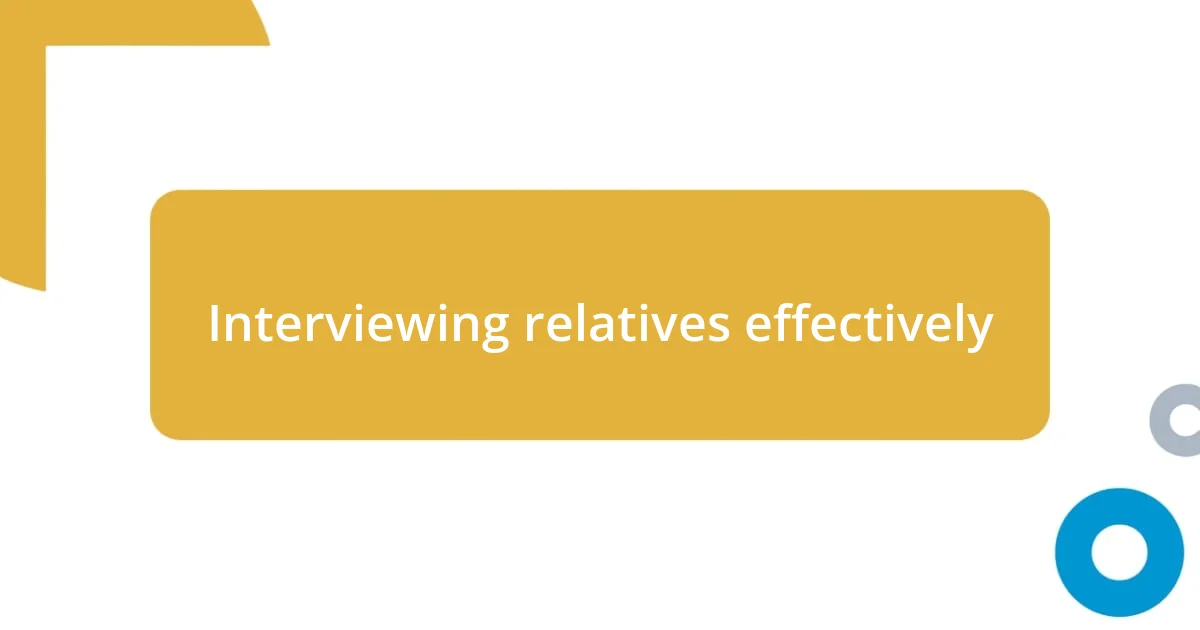
Interviewing relatives effectively
When it comes to interviewing relatives, I find that setting the right mood can make all the difference. I remember sitting on my grandmother’s porch one summer evening, with the sunset casting a warm glow. The soft rustle of the leaves provided the perfect backdrop for her to open up about her childhood, and it felt like we were in a world of our own. Have you ever noticed how a comfortable environment encourages people to share more? It’s key to help relatives feel at ease, which often leads to richer stories.
Asking open-ended questions is another strategy that I’ve found effective. For instance, instead of simply asking, “What was your job?” I would try, “Can you tell me about a memorable day at work?” This subtle shift in the question invites a narrative rather than a yes-or-no response. One time, my uncle shared a hilarious incident from his days in the military that I never would have heard if I hadn’t prompted him with that type of question. It’s fascinating how one simple inquiry can unlock a treasure trove of memories.
Lastly, I’ve learned that active listening is crucial during these interviews. Really focusing on what my relatives are saying, rather than just waiting for my turn to speak, has occasionally unveiled astonishing stories. I recall a moment when my aunt recounted a difficult decision she made in her youth. I could see the emotions on her face, and it hit me deeply. It made me realize that each story is not just an account of events but an emotional journey worth exploring. Have you ever found yourself lost in such a moment? Those connections can tremendously strengthen family bonds and create a lasting impact on your understanding of your roots.
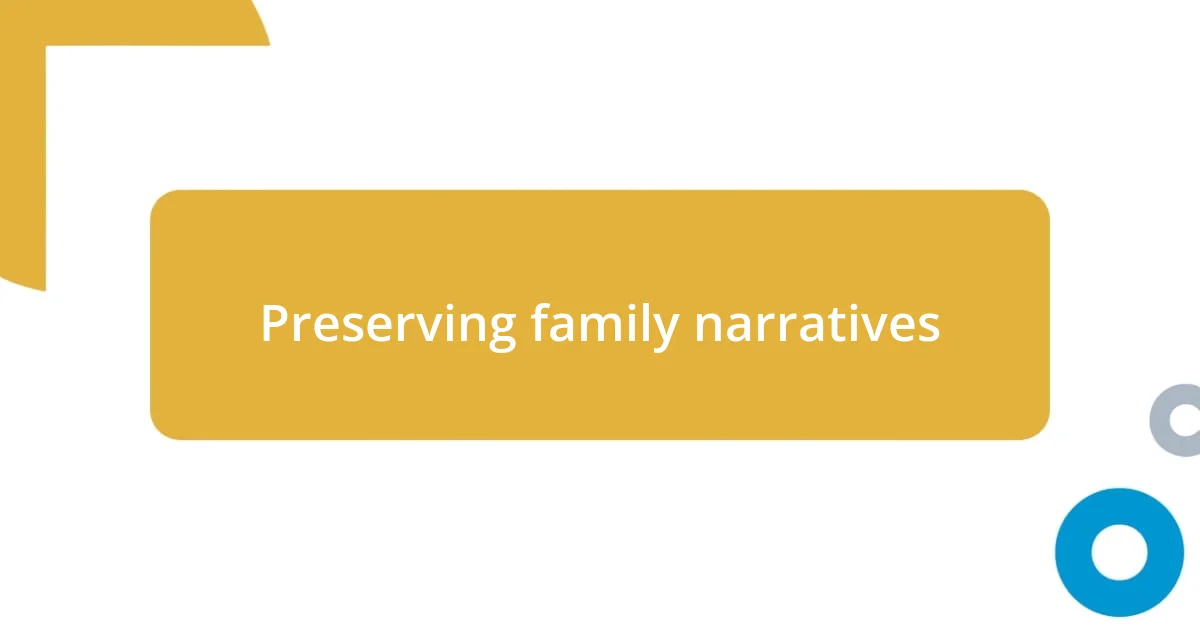
Preserving family narratives
When it comes to preserving family narratives, I’ve discovered that creating a family archive can be an exciting and fulfilling project. I remember one evening sifting through an old box filled with photographs and memorabilia. It felt like unearthing a treasure chest! Each item told a story, and I began to compile a digital collection. Have you ever sorted through family heirlooms? Reflecting on those memories, I realized I was not just preserving history but connecting the past to the present for future generations.
I also believe in the power of recording oral histories. A few summers ago, I invited my grandparents over for dinner, turning it into a chance to record their stories. As they recalled their experiences of immigrating to a new country, I felt an overwhelming sense of gratitude. Their laughter and occasional tears brought their narratives to life in a way that written words never could. It made me wonder—what would happen to these stories if I hadn’t taken the time to document them? Preserving these moments feels essential, not just for my family but as a legacy for my children.
Lastly, I advocate for incorporating storytelling traditions, especially during family gatherings. One holiday, we decided to share our favorite family memories instead of the usual small talk. The atmosphere shifted as laughter and nostalgia filled the air. It was enlightening to hear how each story, from Uncle Joe’s fishing mishaps to my aunt’s dance contests, represented our shared identity. Have you thought about how storytelling can transform family dynamics? This practice not only preserves our narratives but strengthens the bonds that connect us as a family.
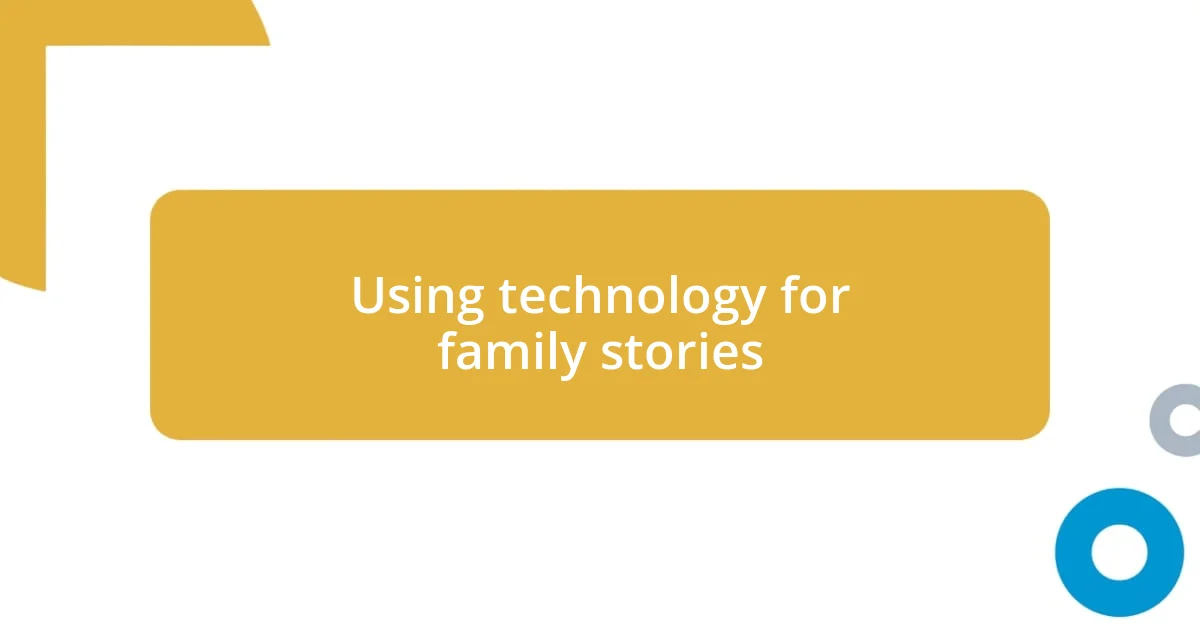
Using technology for family stories
Using technology to preserve family stories has truly revolutionized how we connect with our roots. I vividly remember the first time I tried recording a family gathering using my smartphone. The video captured not just the stories shared but also the laughter, the little moments that made my heart swell with joy. Isn’t it amazing how technology allows us to encapsulate these fleeting experiences? With a simple tap of a button, those precious memories can be replayed for generations to come.
Moreover, I’ve found that social media platforms can be a delightful way to engage with family narratives. A few months ago, I created a private Facebook group for my extended family, inviting everyone to share photos and anecdotes. It became a hub of nostalgia; the comments and stories that flowed sparked connections I hadn’t anticipated. Have you ever experienced that rush of joy when someone shares a memory that resonates with you? It reminds us of the shared tapestry of our lives and how intertwined our stories really are.
Finally, utilizing genealogy websites can be an insightful way to deepen our understanding of where we come from. When I first explored one of these platforms, I stumbled upon records of my great-grandparents that opened up a whole new perspective on my family history. It felt like solving a mystery, piecing together their lives from mere names and dates. Have you delved into your ancestry online? I discovered a few unexpected relatives along the way, which led to fascinating conversations that enriched my personal understanding of heritage. With technology at our fingertips, the possibilities to discover and document family stories are virtually limitless.
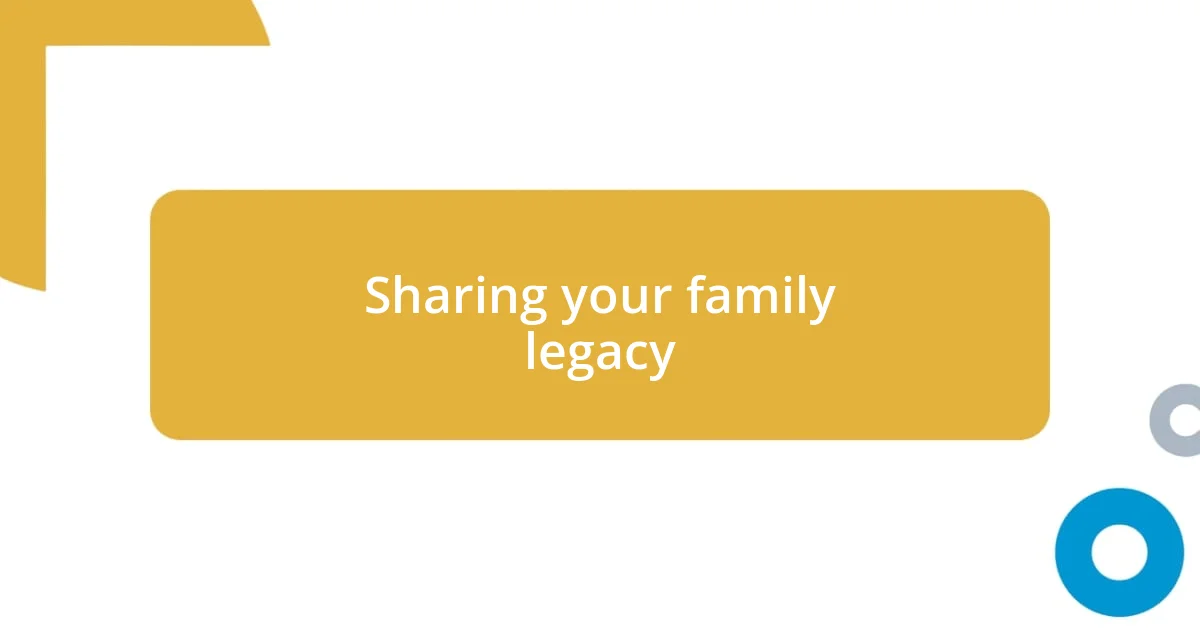
Sharing your family legacy
Sharing your family legacy can be a deeply enriching experience that connects generations. I recall a weekend spent at my childhood home, where my mother unveiled an old scrapbook filled with handwritten letters and newspaper clippings from my grandparents’ era. As we flipped through the fragile pages, I felt an overwhelming wave of emotion. Have you ever discovered something about your family that made you see them in a whole new light? This treasure trove of memories illuminated not just who they were, but also the values they instilled in our family.
Participating in family reunions provides an incredible opportunity to share our legacies in real-time. I’ll never forget one reunion where we all gathered around a bonfire, sharing stories from our past. As each person spoke, I felt a collective pride rising within us—our unique histories woven into a shared narrative. Have you ever felt that powerful connection when someone shares a part of their life that mirrors your own? It was a reminder of how much we genuinely shape each other’s stories over generations, cementing our family ties with each recollection.
Lastly, consider the impact of writing letters to future generations. I was inspired to pen a heartfelt message to my future grandchildren after reflecting on the life lessons I’ve learned. The exercise was surprisingly poignant, as I wrote about dreams, hardships, and the love that has shaped my journey. Don’t you think it’s essential for our descendants to understand the struggles and triumphs we experienced? This letter, tucked away for them to find, represents not just my legacy but a bridge connecting their past to their future.




